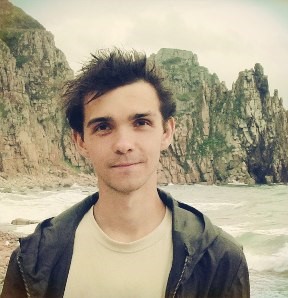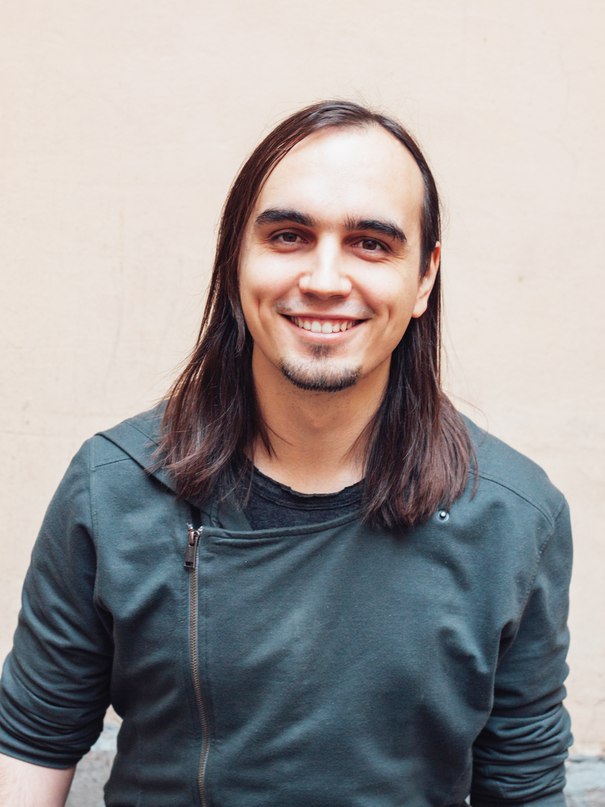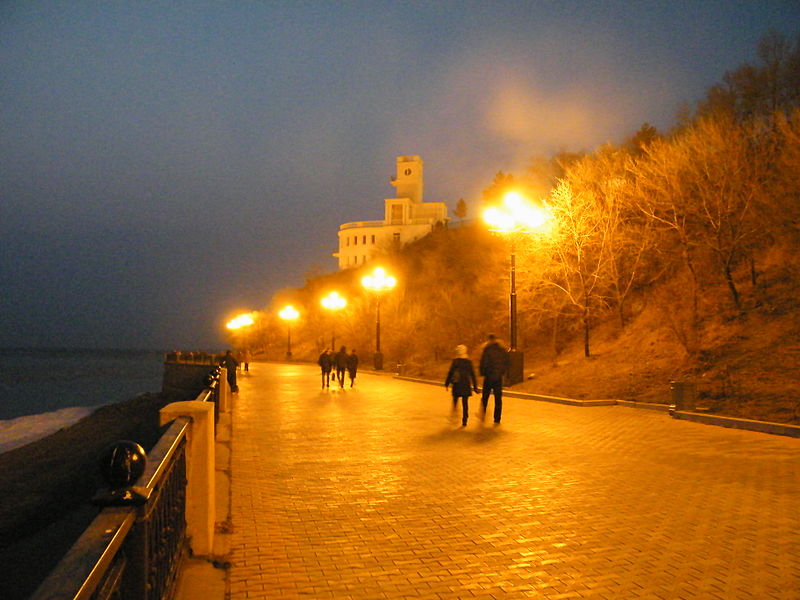
Alexander Malakhov

Eugene Pustoshkin
This interview was translated from Russian by Eugene Pustoshkin.
— Hello, Alexander! Could you please tell us about yourself: what do you do and what are you interested in?
— Hi, Eugene! For the past several years I prefer to call myself an integral scholar-practitioner and attempt to combine fundamental cross-cultural and postdisciplinary research with my engagement in practical and transformative activities. Right now I’m in preparation for receiving a PhD in Sociology from the Pacific National University (Khabarovsk, Russia). My dissertation examines the relationship between religion and science and is based on Integral Theory. My main interests include theology and religious traditions (Islam and Christianity), world philosophy, consciousness studies, human development and the range of themes which can be referred to as “creating a better world.” In addition to that, quite surprisingly for myself, I became preoccupied with launching an integral initiative in the field of medicine—after I felt, in an altered state of consciousness, how precarious the condition of the healthcare system in Russia is. And, of course, just as you, I am devoted to cultivating the integral impulse in Russia, as a part of our collective publication Eros & Kosmos (http://eroskosmos.org/english) and my own individual project “Quadrants: An Integral Lab” (http://quadrants.link/).

Photo: The city of Khabarovsk in the Far East of Russia. Source: Wikipedia.
— How would you characterize the current condition of the world Integral movement? What is its state now? What, in your opinion, is the role and significance of Ken Wilber in all of that?
— The Integral movement still exists more in our dreams than in reality. We could speak about integral communities, networks of activists, but a full-blown movement needs a shared agenda of actions, alongside with willingness to coordinate activities closely among each other, and, finally, a clearly formulated credo—some sort of minimum set of views, agreeing with which is required for being acknowledged as someone who belongs to the Integral movement. I suggest that we ground our activities in the commonly shared goal: accelerated emergence of an Integral Age. The planetary scale of such a goal suggests that the Integral movement and its allies must become a global force which plays an important role in all areas—from religion to science to culture to economics to politics, and so on. Obviously, this is not a trivial task.
I think that, today, it is too early to speak about the role of Wilber in history. Imagine if we had attempted to define the place of Marx in world history, living in 1866, a whole year before his Capital was published. But we can certainly evaluate Ken’s place in the Integral enterprise: he has definitely been playing a key role in it, no matter whether we agree with his approach or not.
— Could you please go into more details as regarding to the agenda you mentioned? What precisely do you mean? How do we create it? What must it include?
— At first, probably, it is necessary that a group of Integral leaders brings forth such an initiative, outlining a very general and broad vision in a few sentences. Then, a self-census of the Integral movement may be initiated: organizations, communities, and individual enthusiasts could “sign” themselves in on a special website, signing at the same time the Declaration of Intent. If a critical number of participants would be gathered, the initiative could be supported by the primary forces of the Integral movement, and an opportunity for developing a clearer and more differentiated agenda would emerge. This agenda would set shared goals, priorities in activities, basic rules, and so on. Of course, in the process we would encounter many hidden pitfalls and implicit conflicts. If these problems were to be solved, then one would be able to speak about the formation of the Integral movement.
— You and I, we’ve been discussing the problem of premature devaluation; could you talk about your attitude towards various attempts to devalue Wilber’s contribution?
— In fact, it is still a mystery to me why Ken generates such strong negative emotions in such a large amount of people; why there are more articles which argue that “Wilber is wrong in this or that” than articles which develop upon his ideas or actually test them. However, there is another side of the coin: the drive towards transcending and including is foundational to an Integral thought. It is not surprising then that for many people who identify with it Wilber is the first whom, as they feel, they need to urgently “transcend and include.” Here is a fundamental problem for any integral approach: an all-inclusive theory must also be self-transcending. This factor could be a source of creativity and dynamism, continuous renewal and development, but only in the case of cautious and caring attitude towards the labor of your predecessors. As of now, our Integral brothers and sisters are often driven to leap into the unknown Further without carefully reviewing the very place they are already finding themselves in and without learning how they got there in the first place. It is akin to an attempt to build new floors in a building without finishing the lower ones. An in-depth study of Wilber’s works is necessary, and it is also necessary to unpack their inherent potential. The problem is not limited to Ken’s contribution only: whether it is Rudolf Steiner, Jean Gebser, Sri Aurobindo or Ervin Laszlo—in their legacy there is a huge potential, and its unpacking would require thousands of hours of research and meditations.
— In your opinion, which directions of research and activities are most strategic for humanity from the perspective of postconventional and Integral studies?
— There are well-known challenges such as global warming which humanity will have to deal with in the nearest half-a-century. Now it is already possible to develop effective responses to these challenges using Integral Theory. The main obstacle here lies in communicating Integral solutions to those who have resources that are necessary for their implementation. Amongst especially significant areas for Integral practice I would emphasize education and medicine. Education—because it is an institute which in many ways determines the consciousness and worldview of a human being and reproduction of society. Medicine—because applying the Integral approach towards it, in my opinion, could become a sound demonstration of its capacities and potential. These are the areas which are in desperate need of a revolution, that’s why even modest initiatives could exert dramatic influence on them.
As for research, there are literally hundreds of essential questions that require full attention of Integral scholars-practitioners. Some of it can be studied in academia, but most of it, especially related to the transpersonal realm, requires a postconventional scientific infrastructure which we still have to create.
— What other problems could you bring into our focus?
— Two words: generational change. This is a problem both for the Integral enterprise and transpersonal psychology, as well as other complementary movements. We have an entire generation of founding geniuses which includes Ken Wilber, Ervin Laszlo, Barbara Marx Hubbard, Charles T. Tart and almost all other key figures. But will there still be similarly influential and charismatic leaders after their generation retires? The future of this project and, possibly, the future of human evolution will depend upon it.
There is another issue—what can be called “hidden Americanism.” Most proponents of Integral Theory live in the United States, and contemporary Integral discourse often focuses on issues which are relevant mostly to this country only. Some sort of organic development of Integral communities in other countries and cultures must happen, especially in those lands which have their own long history of integrative thought. Russia is, no doubt, one such country. It is not colonization of other traditions by one tradition, but their mutual dialogue, resonance, and genuine integration that are needed.
The third problem is factionalism which prevents formulating a collective program, accumulating resources, and realizing large-scale initiatives.
— What is your view on the role of religions and spirituality today? What does the Integral movement lack in this sense?
— Numerous predictions suggest that in this century the influence of religions will grow. I tend to be in agreement with such a prognosis. We will face the reenchantment—and, possibly, desecularization—of the world. Atheism will remain a significant power in the West, in Russia, and China, but in most countries the choice will be made among various types of religion and spirituality. Religion is an irremovable and inherent component of human civilization, which in its best forms allows people to effectively discover their true nature and meaning of their existence. “Spirituality without religion” is in most cases a profanation of spiritual search and a refusal to take upon oneself commitments that are related to it. In no way this means that every human being must profess one and only confession, but mature spirituality requires, in addition to help from above (or grace), a systematic discipline, turning towards experience of predecessors, and illuminated insights of theologians; all of it, first and foremost, is possible only in a context of the great religions.
In the Integral Movement there is a strong bias in favor of Eastern religions, primarily various forms of Hinduism and Buddhism. At the same time we still witness remaining underestimation and selective understanding of Christianity and Islam. You simply cannot take concepts that are appropriate for Advaita and mechanically apply them to another religion and think: voilà, we found a compromise! Christianity cannot be reduced to Meister Eckhart, and Islam to Rumi—and popular understandings of either has nothing in common with what their teachings actually were. Integral students must deeply study theology, history, and the whole diversity of schools of spirituality that exist in religions; they have to learn these religions’ language and their “tunnel of reality,” practice and feel faith the way the adepts of these religions do.
— One could often encounter the criticism of Wilber’s views on evolution, however, upon a detailed investigation, it seems that such a critique is too hasty. Could you please say a few words about Wilber’s evolutionary views and the strange attitude of critics towards them?
— I think we can speak of two questions: (1) Is Wilber right in his criticism of ultra-Darwinism and biological reductionism? (2) Is Wilber’s interpretation of the global evolution of the Kosmos justifiable? Regarding the first question, Wilber is certainly correct: only by violently forcing one’s mind to remain within the limits of mechanistic biology and ignoring all the body of evidence which contradicts this paradigm it is possible to believe that a monological and fragmentary theory could explain the miracle of life or the existence of witnessing consciousness. Wilber’s view of evolution of the Kosmos is consistent and represents a continuance of the views of many of the greatest philosophers of West and East. Such a view could be contested (while I myself am partially an adherent to it), but such contesting has to be done from more profound premises than those which we can find in the reductionist life sciences.
— Among numerous other things, you study anomalous psychic phenomena: what is it and what is their meaning? What is their significance for the Integral approach?
— As it is the case for many people, my interest in them grew out of my own personal anomalous experience which I wasn’t able to explain. It is noteworthy that initially, only six years ago or so, I was skeptical towards parapsychology. I didn’t believe that scientific methods (mostly, third-person methodologies) can shed any light on such “subtle” questions. Now I can confidently assert that, although it is true that scientific methodology has serious limitations, it can be used to convincingly demonstrate transsubjective reality of psi phenomena and study some of their aspects. In the Soviet Union there was a large-scale research program of studying anomalous phenomena; still, to this day, Russia is one of the leaders in this area, even though only a small bit of Russian works is translated to English, so it remains to be unknown outside the post-Soviet territories. In the West, there are dozens of brilliant researchers such as Dean Radin, Etzel Cardeña and Patricio Tressoldi, whose research leaves little if any chances to skeptics.
The case of psi phenomena is unique in that, even when we limit ourselves to third-person methodologies, we can confirm the existence of non-material aspects of reality and the fact that our consciousness is not limited by brain or body. Psi phenomena disclose the existence of the problem of “strong consciousness”—that kind of consciousness which is capable to exert remote influence and know that which it couldn’t have possibly known and even, at least in some senses, survive death of the brain. It is a serious challenge to the philosophy of consciousness—the challenge which physicalists prefer to ignore. There is one more point: if we manage to learn how to develop and control psychic capacities, this will exert a fundamental influence on human civilization. It is quite likely that attainment of higher levels of consciousness would include a growth in psi capacities.
— And the last question: recently, you published the first or one of the first articles in Russian on the subject of Integral Sociology (Malakhov 2016), and it was selected as the best article of the issue (among the three dozens of articles, written mainly by PhDs). You were selected as “the person of the issue.” I commend you for this achievement! Could you please tell us about this article and your vision of Integral Sociology?
— Thank you! It was quite a surprise for myself as well. Integral sociology is a project which is only awaiting its realization, and my own works—this article included—are, in a sense, a propedeutics or preliminary study of it. As the ground framework that is not the only possible but probably one of the best that we currently have, I use Ken Wilber’s Integral Theory. In a most general sense, Integral sociology must freely operate with a maximum amount of approaches—from phenomenological sociology to neurosociology—and enact the perspectives of various cultures in their own terms and be open to transrational knowledge and transpersonal experience. Integral sociology, as any other Integral science, cannot be limited to its epistemological mission: its true purpose is to foster awakening and liberation of humanity from its exterior and interior fetters.
References
Malakhov, A. V. A Possibility of Integral Sociology: Preliminary Observations [in Russian]. Theory and Practice of Social Development: International Scientific Journal. 2016. No 2. [The text in Russian can be accessed here or from the author’s website.]
About the Interviewee
Alexander Malakhov, M.S.W., is an integral scholar-practitioner & PhD Researcher at Pacific National University (Khabarovsk, Russia). His main interests include Integral Theory, world philosophy, relationship between religion and science, altered states of consciousness, and human liberation. He is the founder of “Quadrants: Integral Lab” and an Associate Editor of Eros & Kosmos (see: http://eroskosmos.org/english). Contact email: alex@malakhov.link
About the Interviewer
Eugene Pustoshkin is an integral psychologist, translator, and integral scholar-practitioner. He lives in St. Petersburg, Russia, and currently serves as the Chief Editor of Eros & Kosmos (see: http://eroskosmos.org/english), the Russian Integral online magazine he co-founded; he is also the Bureau Chief / Associate Editor for Russia at Integral Leadership Review. Eugene graduated as specialist in clinical psychology from St. Petersburg State University, and now maintains private practice, offering counseling in Integral psychotherapy and mentoring in Integral Theory. He translated several books by Ken Wilber and works of other Integral authors. Since 2014, he has been organizing and co-facilitating (together with Helsinki-based therapist Sergey Kupriyanov, PhD in Medicine) Holoscendence workshops in Russia and other countries. Contact email: eapustoshkin@gmail.com
